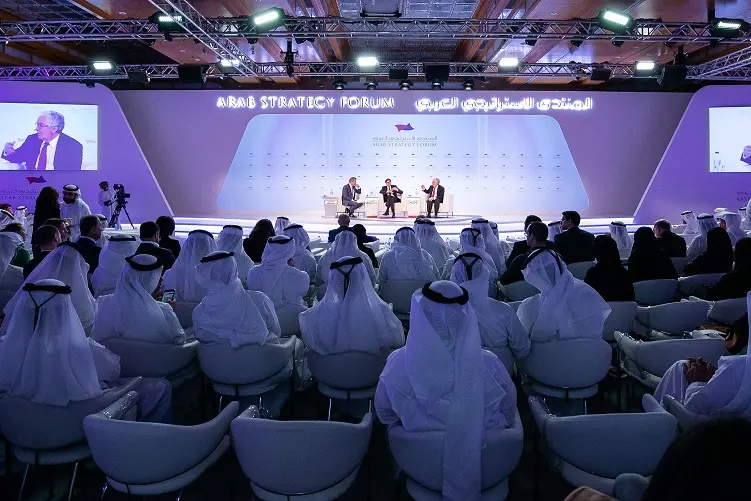PHOTO
The United States could find ways to fix tensions with China and North Korea, while Iran could take a wait-and-see approach until the 2020 U.S. presidential elections, the founder of US-based political risks group Eurasia told delegates at the Arab Strategy Forum on Wednesday.
Speaking at the event in Dubai, Eurasia Group founder and president, Ian Bremmer said: “When I look at 2019, you specifically asked me to talk about 2019, I don’t feel that bad.”
Bremmer said he was hopeful that there would be no severe deterioration in the relationship between the U.S. and North Korea, where the threat of the latter’s nuclear capabilities has loomed large in recent years. He also does not envisage any major dispute emerging between the U.S. and China, despite the former’s decision to impose tariffs on imports from China, which are due to ramp up next year if a truce on trade sanctions declared at the G20 Summit in Argentina earlier this month expires without a new trade deal.
“So yes, I believe U.S - North Korea relations are going to get much more challenging in the coming year but there is going to be another summit with Trump and they are engaging with the South Koreans, they are engaging with the Chinese, even the Japanese at the foreign minister level, which means the likelihood that this escalates into explosive confrontation next year is still low,” Bremmer said.
President Trump has held a landmark meeting with the North Korean President Kim Jong Un in June and said in October that he would hold another meeting once last month's U.S. congressional elections were concluded.
On U.S.-Chinese relations, Bremmer said: “The United States and China are trying to find ways especially (now) that China’s economy softened a little bit to ensure that they can work together on trade,” he added.
The U.S. and China have engaged in a number of trade talks, with the latest taking place on Tuesday through a phone call involving the U.S. Treasury Secretary Steven Mnuchin, U.S. Trade Representative Robert Lighthizer and Chinese Vice-Premier Liu He, according to a Wall Street journal report.
Elsewhere, Bremmer said that it is an “unfortunate time” for Europe, with many of its biggest economies facing upheaval. Violent protests are continuing in Paris which were sparked by the introduction of a new carbon tax on fuel, and in Britain Prime Minister Theresa May is still facing a potential rejection of her Brexit plan for withdrawal from the European Union despite surviving a vote of no confidence called by her own party members on Wednesday night.
Bremmer said such events make European states “not act like Europe” and “not carry the weight of Europe”.
The Arab region
In the Middle East, Bremmer said he was hopeful about a potential normalisation in the relationship between Qatar and several Arab states. Saudi Arabia, the UAE, Egypt and Bahrain have all cut political and transport ties with Qatar last year, accusing the country of interfering in their internal affairs and supporting terrorism. Qatar denies these allegations.
“I do take the… GCC summit in a positive way. Certainly the fact that the Qataris were there, the facts the Kuwaitis said the media needs to be more responsible. The fact that the Saudis and Qataris directly engaged,” Bremmer said, adding that this gave positive indications about a coming breakthrough.
Saudi Arabia’s King Salman bin Abdulaziz sent a written invitation to Qatar's emir, Sheikh Tamim bin Hamad Al Thani to attend the annual GCC summit which took place in Riyadh last Sunday. However the Qatari emir did not show up and instead delegated his state minister for foreign affairs to attend the summit - a move that was publicly criticised by Bahrain.
Bremmer said an end to the political tension between the four Arab states and Qatar would be positive for the region and welcomed by the United States.
For Syria, Bremmer was less hopeful: “(Barack) Obama said Assad had to go, Obama is now gone, (Syrian President) Bashar Al-Assad is still there and (Al) Assad is not going anywhere. 560,000 people dead. We now see five million refugees, half of the population displaced,” he said, calling it a “massive humanitarian crisis”.
Syria has been in a civil war for nearly eight years. The conflict started shortly after the eruption of pro-democracy Arab Spring protests in Syria in March 2011 that quickly took a violent turn.
On Iran, Bremmer said he thinks the Iranian strategy would be to try to “stay in good behaviour” in the hope that President Trump loses the U.S. General Election in 2020 and the next American regime adopts softer policies towards Iran.
A number of economic sanctions were re-imposed on Iran by President Trump after they were lifted in a landmark deal brokered by the Obama administration in July 2015.
He said he does not think 2019 will be a “blow-up year” on other geopolitical fronts.
(Reporting by Yasmine Saleh; Editing by Michael Fahy)
© ZAWYA 2018





















